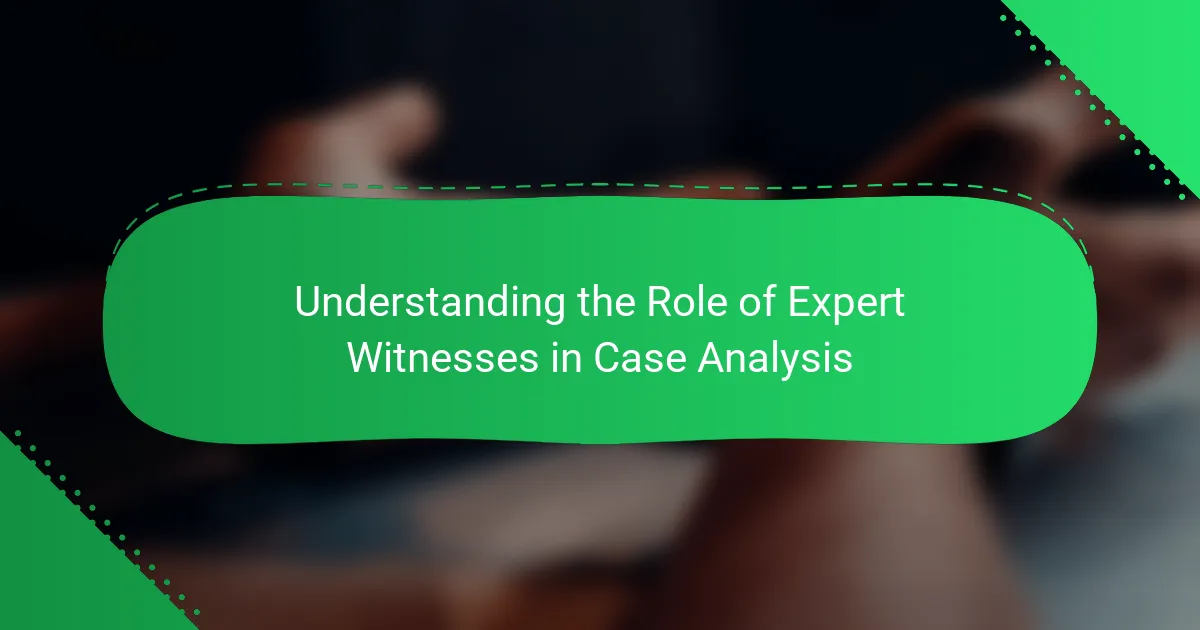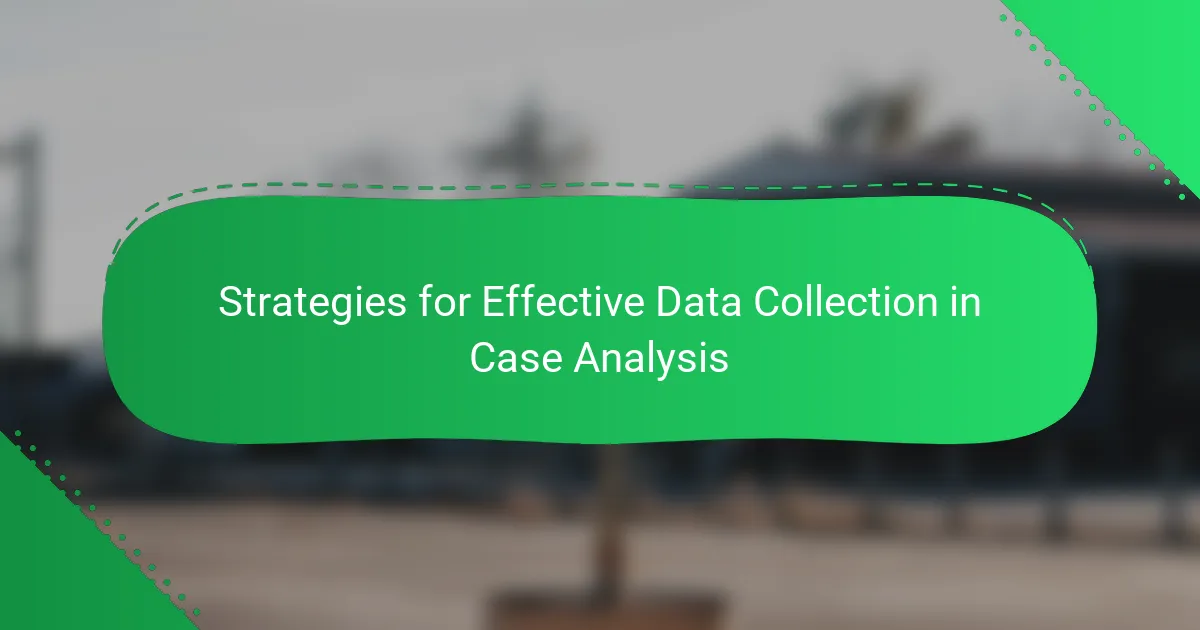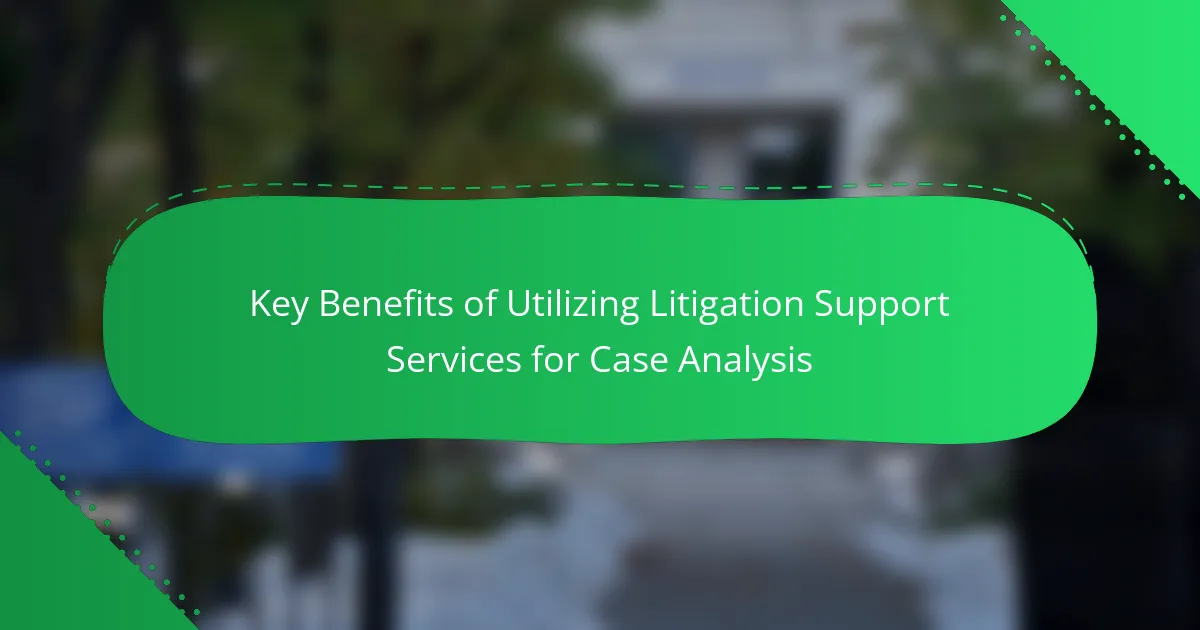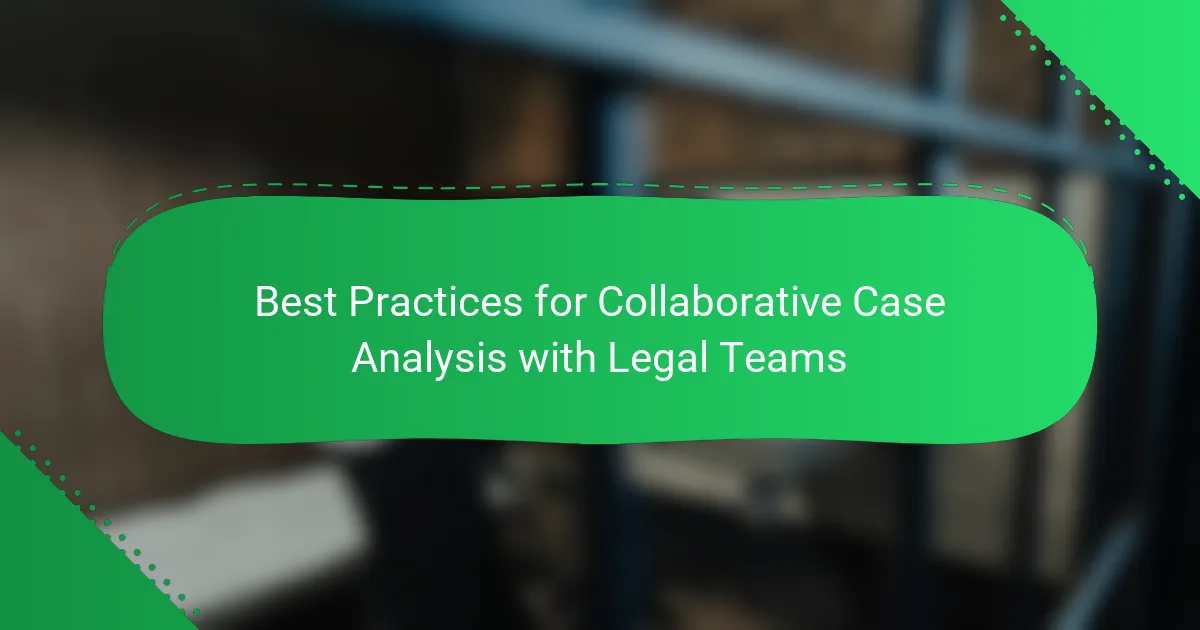Expert witnesses are professionals who provide specialized knowledge and insights in legal case analysis. They play a crucial role in clarifying complex issues for judges and juries by analyzing evidence and offering informed opinions based on their expertise. The article explores how expert witnesses prepare reports, testify in court, and establish critical facts that influence case outcomes. Their credibility hinges on qualifications, experience, and relevant research, making their testimony essential for courts to make informed decisions in specialized fields. Understanding the role and impact of expert witnesses is vital for grasping their significance in the legal process.
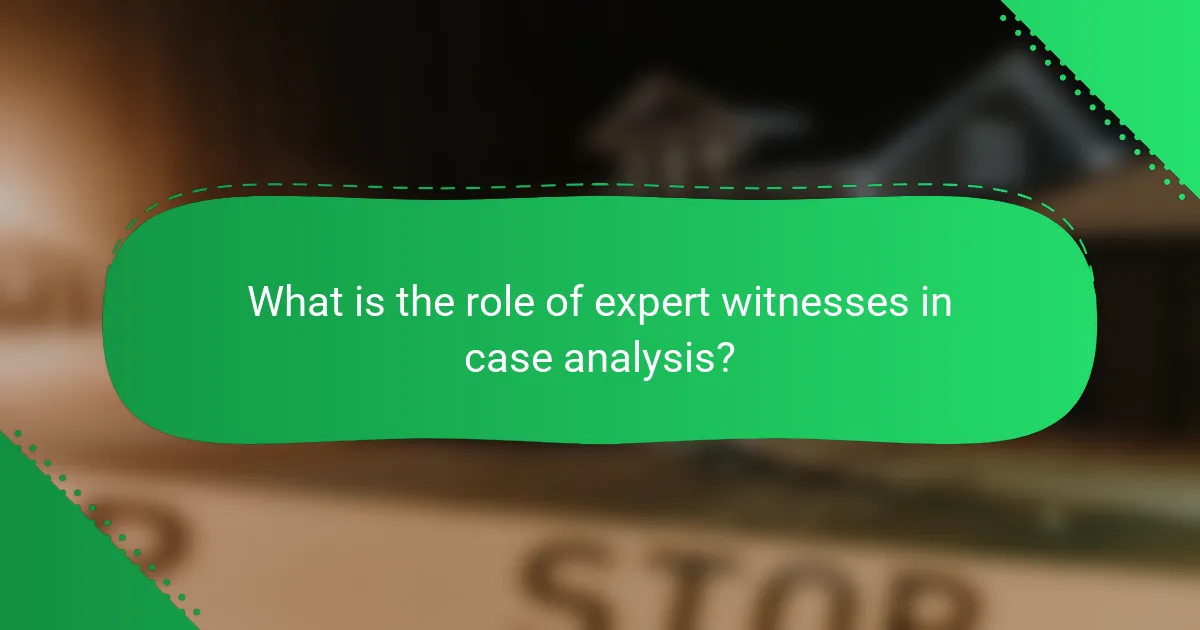
What is the role of expert witnesses in case analysis?
Expert witnesses provide specialized knowledge in case analysis. They assist in clarifying complex issues for judges and juries. These professionals analyze evidence and offer opinions based on their expertise. Their insights can significantly influence case outcomes. Expert witnesses often prepare reports and testify in court. They help establish facts that are critical to legal arguments. Their credibility is based on qualifications, experience, and relevant research. Courts rely on expert testimony to make informed decisions in specialized fields.
How do expert witnesses contribute to legal proceedings?
Expert witnesses contribute to legal proceedings by providing specialized knowledge and opinions. They help clarify complex issues for judges and juries. Their expertise can influence the outcome of a case significantly. Expert witnesses are often called upon to testify about technical matters. This includes fields such as medicine, engineering, or finance. Their testimony can lend credibility to a party’s claims. Courts rely on expert witnesses to present objective analysis. This helps ensure that decisions are based on informed perspectives.
What specific expertise do expert witnesses provide?
Expert witnesses provide specialized knowledge in specific fields relevant to legal cases. Their expertise often includes technical, scientific, or professional insights that are beyond the understanding of a layperson. They assist in clarifying complex information for the court. This can involve interpreting data, explaining methodologies, or providing opinions based on their professional experience. Expert witnesses are often called upon in areas such as medicine, engineering, finance, and forensics. Their testimony can influence the outcome of a trial by providing credible evidence. Courts rely on their qualifications and experience to establish credibility. The use of expert witnesses is supported by legal standards, ensuring their opinions are based on reliable principles and methods.
How do expert witnesses enhance the credibility of a case?
Expert witnesses enhance the credibility of a case by providing specialized knowledge and objective opinions. Their expertise helps clarify complex issues for the court. This can lead to more informed decision-making by judges and juries. Expert witnesses are often recognized authorities in their fields. Their qualifications and experience bolster the case’s legitimacy. Studies show that cases with expert testimony are more likely to succeed. For instance, a report by the National Center for State Courts indicates that expert witnesses significantly influence jury perceptions. Their ability to explain technical aspects can demystify evidence. This contributes to a clearer understanding of the case’s merits.
What types of expert witnesses exist?
There are several types of expert witnesses. They include medical experts, who provide insights on health-related issues. Forensic experts analyze physical evidence from crime scenes. Technical experts offer knowledge in specialized fields like engineering or computer science. Vocational experts assess employability and earning potential. Financial experts analyze economic data and financial records. Each type plays a crucial role in legal proceedings by providing specialized knowledge. Their testimonies help clarify complex issues for judges and juries.
What are the different fields of expertise for expert witnesses?
Expert witnesses specialize in various fields, providing testimony based on their expertise. Common fields include medicine, engineering, finance, and psychology. Medical expert witnesses assess injuries and treatment standards. Engineering experts evaluate design and safety standards. Financial experts analyze economic damages and financial practices. Psychological experts provide insights into mental health and behavior. Each field requires specific qualifications and experience to ensure credibility in legal settings.
How do the qualifications of expert witnesses vary by field?
The qualifications of expert witnesses vary significantly by field. In medicine, experts often require advanced degrees and board certifications. Forensic experts may need specialized training in criminal investigation techniques. Engineering experts typically hold professional licenses and relevant experience in their specific engineering discipline. Financial experts often possess certifications like CPA or CFA, along with extensive industry experience. The legal field demands that experts have a deep understanding of relevant laws and regulations. Each field has its own standards for education, experience, and certifications necessary to establish credibility. This variation ensures that expert witnesses provide reliable and relevant testimony tailored to the specifics of each case.
What are the key responsibilities of expert witnesses?
Expert witnesses provide specialized knowledge and opinions in legal cases. Their key responsibilities include evaluating evidence relevant to their expertise. They analyze technical information to clarify complex issues for the court. Expert witnesses prepare reports summarizing their findings and opinions. They may also provide testimony during trials or depositions. Their role includes educating the judge and jury about technical matters. Maintaining objectivity and impartiality is crucial in their evaluations. Expert witnesses must adhere to professional standards and ethical guidelines in their work.
How do expert witnesses prepare for testimony?
Expert witnesses prepare for testimony by thoroughly reviewing case materials. They analyze relevant documents, evidence, and prior depositions. This helps them understand the context of the case. Expert witnesses also consult with attorneys to clarify their role and expectations. They participate in mock trials or practice sessions to refine their delivery. Familiarity with courtroom procedures is essential for effective testimony. Expert witnesses often stay updated on industry standards and practices. This preparation enhances their credibility and effectiveness in court.
What role do expert witnesses play in case strategy?
Expert witnesses provide specialized knowledge that informs case strategy. They analyze evidence and explain complex concepts to the court. Their insights can clarify technical details that are crucial for understanding a case. This expertise can influence the judge’s or jury’s perception of the evidence. Additionally, expert witnesses often contribute to the development of legal arguments. Their credibility can enhance the overall strength of a case. Studies show that cases with expert testimony are more likely to succeed. For instance, a study published in the Journal of Legal Studies found that expert witnesses significantly impact jury decisions.
How do expert witnesses impact case outcomes?
Expert witnesses significantly impact case outcomes by providing specialized knowledge and credible testimony. Their expertise helps clarify complex issues for judges and juries. This clarity can influence perceptions and decisions regarding liability or damages. Studies show that cases with expert witnesses often result in more favorable outcomes for the party that presents them. For instance, a report by the National Center for State Courts indicates that expert testimony can increase the likelihood of winning a case by up to 30%. Additionally, expert witnesses can enhance the credibility of legal arguments, making them more persuasive. Their analysis often guides legal strategies, affecting how cases are presented and negotiated.
What evidence supports the effectiveness of expert witnesses in trials?
Expert witnesses enhance trial effectiveness by providing specialized knowledge. Their testimony can clarify complex subjects for judges and juries. Research indicates that jurors often rely on expert opinions when making decisions. A study published in the Journal of Forensic Sciences found that expert testimony significantly influenced jury verdicts. In cases involving technical evidence, juries are more likely to favor the side with a credible expert. Additionally, expert witnesses can improve the perceived legitimacy of the evidence presented. Their qualifications and experience lend authority to the testimony. This combination of clarity and credibility supports the overall effectiveness of expert witnesses in trials.
How can expert witnesses influence jury perceptions?
Expert witnesses can significantly influence jury perceptions by providing specialized knowledge and credible testimony. Their expertise helps clarify complex issues for jurors. This clarity can lead to a stronger understanding of the case. Jurors often rely on expert opinions to form their judgments. Studies show that jurors are more likely to trust information presented by recognized authorities. The presence of an expert can enhance the perceived credibility of the evidence. Additionally, expert witnesses can frame the narrative in a way that supports a specific viewpoint. This framing can sway jurors’ emotions and attitudes, impacting their decision-making process.
What challenges do expert witnesses face in case analysis?
Expert witnesses face several challenges in case analysis. One major challenge is the complexity of the subject matter. They must understand intricate details in their field of expertise. This often requires extensive research and analysis. Another challenge is communicating findings clearly to a non-expert audience. Legal professionals and jurors may lack technical knowledge. Expert witnesses must simplify complex concepts without losing accuracy. Additionally, they face time constraints. Preparing for court can be time-consuming, impacting their regular professional duties. Finally, they may encounter bias or skepticism. Their opinions can be questioned by opposing counsel, requiring them to defend their conclusions robustly.
How do biases affect the reliability of expert witnesses?
Biases significantly undermine the reliability of expert witnesses. These biases can manifest as personal beliefs, professional affiliations, or financial interests. For instance, an expert witness may favor a particular outcome due to their past experiences. This favoritism can skew their interpretations and conclusions. Research shows that cognitive biases, such as confirmation bias, lead experts to favor information that supports their pre-existing views. Additionally, financial incentives can create conflicts of interest, further compromising objectivity. Studies indicate that biased testimonies can mislead juries, affecting case outcomes. Therefore, recognizing and mitigating biases is crucial for maintaining the integrity of expert witness testimony.
What are common pitfalls for expert witnesses during testimony?
Common pitfalls for expert witnesses during testimony include lack of preparation, overstepping expertise, and poor communication skills. Lack of preparation can lead to confusion and inconsistency in responses. Expert witnesses may overstep their expertise by offering opinions outside their qualifications. Poor communication skills can result in misunderstandings or failure to convey complex information clearly. Additionally, emotional involvement can bias their testimony. Failing to anticipate cross-examination questions can also undermine their credibility. These pitfalls can negatively impact the case outcome, as highlighted in various legal analyses and case studies.
How can one select the right expert witness for a case?
To select the right expert witness for a case, first identify the specific expertise required for the case at hand. Next, evaluate the expert’s qualifications, including education, experience, and relevant certifications. Assess their previous testimony experience and how effectively they communicate complex information. It’s crucial to check references and reviews from past clients or cases. Consider the expert’s ability to remain impartial and objective. Analyze their availability and willingness to engage in the case timeline. Finally, ensure their fees align with the budget for the case. Selecting the right expert witness can significantly impact the outcome of legal proceedings.
What criteria should be considered when choosing an expert witness?
When choosing an expert witness, several criteria must be considered. The expert’s qualifications are crucial. This includes their education, training, and certifications relevant to the case. Experience in the specific field is also essential. An expert with extensive experience is often more credible. The expert’s ability to communicate complex information clearly is vital. They should be able to explain their findings in a way that is understandable to a judge and jury. Previous testimony experience is important as well. An expert familiar with courtroom procedures can present their case more effectively. Additionally, the expert’s reputation in their field should be assessed. A well-respected expert can enhance the credibility of the case. Finally, the expert’s availability and willingness to work on the case should be confirmed. These criteria ensure that the chosen expert can provide valuable insights and support during legal proceedings.
How can attorneys effectively collaborate with expert witnesses?
Attorneys can effectively collaborate with expert witnesses by establishing clear communication and defining roles. Attorneys should provide expert witnesses with comprehensive case information. This includes relevant documents and background details. Regular meetings help ensure alignment on case strategies. Attorneys must also set expectations regarding the expert’s contributions. Timely feedback on the expert’s input is essential. This process enhances the quality of testimony and reports. Research indicates that effective collaboration improves case outcomes significantly.
What best practices should expert witnesses follow?
Expert witnesses should adhere to several best practices to ensure their effectiveness in legal proceedings. They must maintain objectivity and impartiality in their evaluations. Clear communication of complex information is essential for understanding. Expert witnesses should prepare thoroughly for their testimony, including reviewing case details and relevant materials. They should also stay within their area of expertise to provide credible opinions. Consistent documentation of their methodologies and findings is crucial for validation. Engaging in continuous education helps them stay current with developments in their field. Finally, they must be aware of the legal standards applicable to their testimony. These practices enhance the reliability and impact of their contributions in court.
How can expert witnesses maintain objectivity and professionalism?
Expert witnesses can maintain objectivity and professionalism by adhering to established ethical guidelines. They should avoid personal biases that may influence their testimony. Maintaining a neutral stance ensures that their opinions are based solely on facts and evidence. Continuous education in their field helps them stay updated on relevant advancements. Clear communication of their methods and findings enhances transparency. Documenting all analysis processes provides a clear trail for review. Engaging in peer review can offer additional insights and validation. Following these practices fosters credibility and trust in their expertise.
What strategies can expert witnesses use to communicate effectively in court?
Expert witnesses can use clear language, visual aids, and analogies to communicate effectively in court. Clear language helps the jury understand complex concepts. Avoiding jargon ensures accessibility for all participants. Visual aids, such as charts or diagrams, can illustrate key points effectively. Analogies relate unfamiliar ideas to common experiences, enhancing comprehension. Expert witnesses should also engage with the jury by making eye contact and addressing them directly. Practicing responses to anticipated questions can improve clarity and confidence. Lastly, maintaining professionalism and composure reinforces credibility. These strategies collectively enhance the effectiveness of communication in court settings.
The main entity of the article is expert witnesses, who play a crucial role in case analysis by providing specialized knowledge and credible testimony in legal proceedings. The article outlines their responsibilities, including evaluating evidence, preparing reports, and testifying in court. It discusses the types of expert witnesses, the qualifications required in various fields, and the challenges they face, such as bias and communication barriers. Additionally, the article emphasizes the impact of expert witnesses on case outcomes and offers best practices for effective collaboration with attorneys and communication in court.
